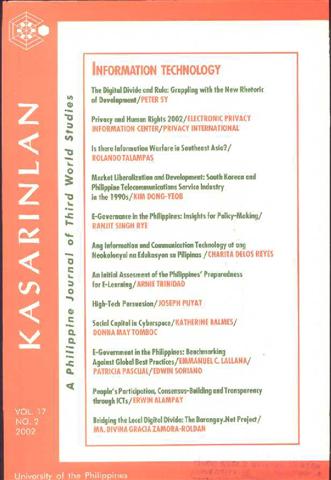E-Governance in the Philippines: Insights for Policy-Making
Abstract
Major transformations in the global political economy have ushered in what is commonly thought of as an information and communication technology-led revolution. While a great deal has been written about some aspects of this "global shift"--the so-called borderless world or intimations of a "new economy"--much less attention has been paid to its significance for politics and policymaking. This paper looks at the relationship between ICT and politics through an examination of the concept and practices associated with e-governance, taken to be integral to the re-shaping of relations between the state, the market and society. The discussion does not assume either the feasibility or desirability of e-governance. Rather it interrogates the governance model itself, and what this signifies for state capacity, through an empirical assessment of e-governance in the Philippines. The concluding argument suggests that there exist outstanding institutional and technological challenges that have yet to be addressed in any systematic way.
Published
2008-05-27
How to Cite
SINGH RYE, Ranjit.
E-Governance in the Philippines: Insights for Policy-Making.
Kasarinlan: Philippine Journal of Third World Studies, [S.l.], v. 17, n. 2, p. 101-138, may 2008.
ISSN 2012-080X.
Available at: <https://journals.upd.edu.ph/index.php/kasarinlan/article/view/707>. Date accessed: 23 sep. 2025.
Section
Features
Keywords
e-governance; policymaking
By submitting a manuscript, the authors agree that the exclusive rights to reproduce and distribute the article have been given to the Third World Studies Center.



